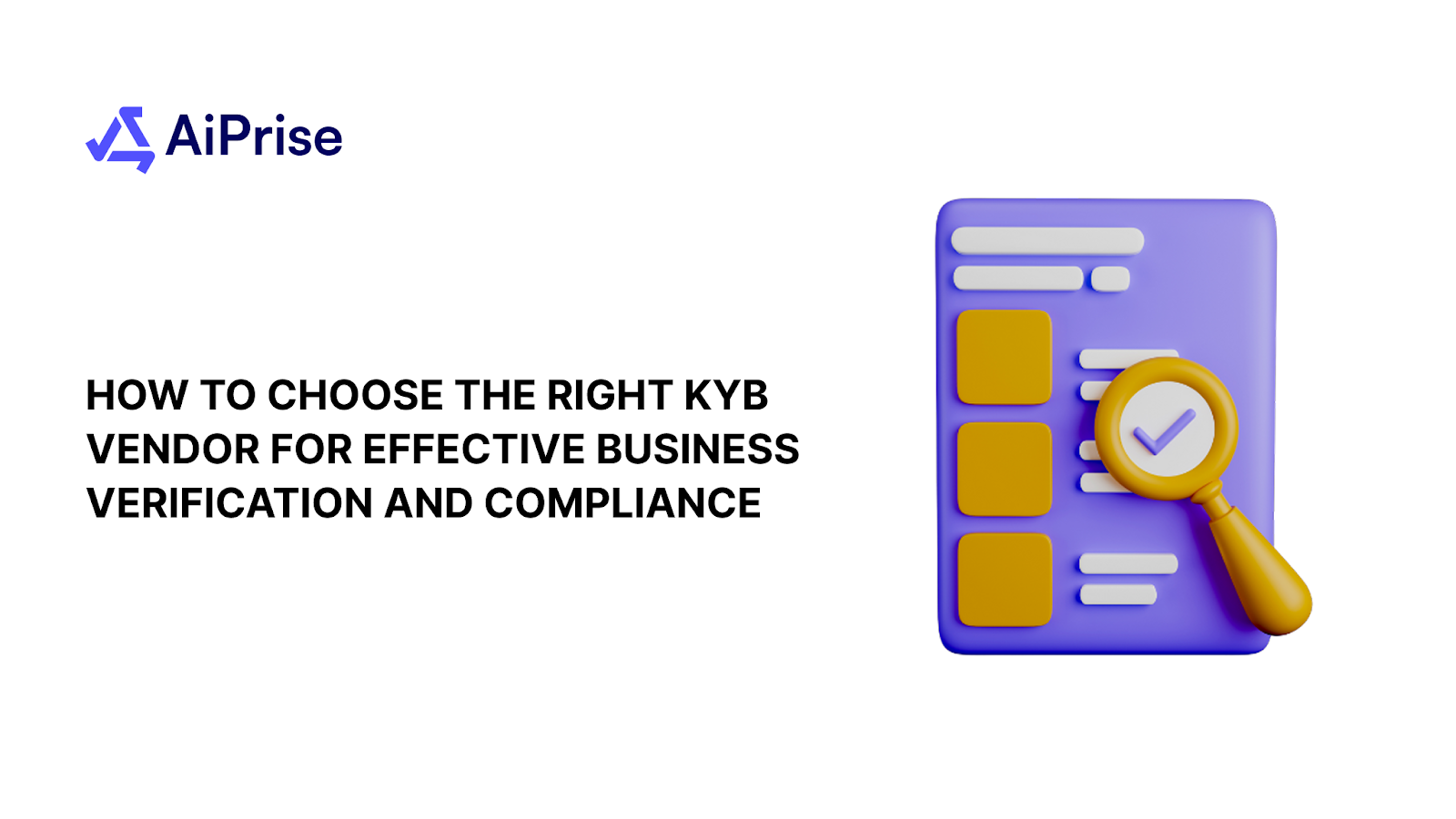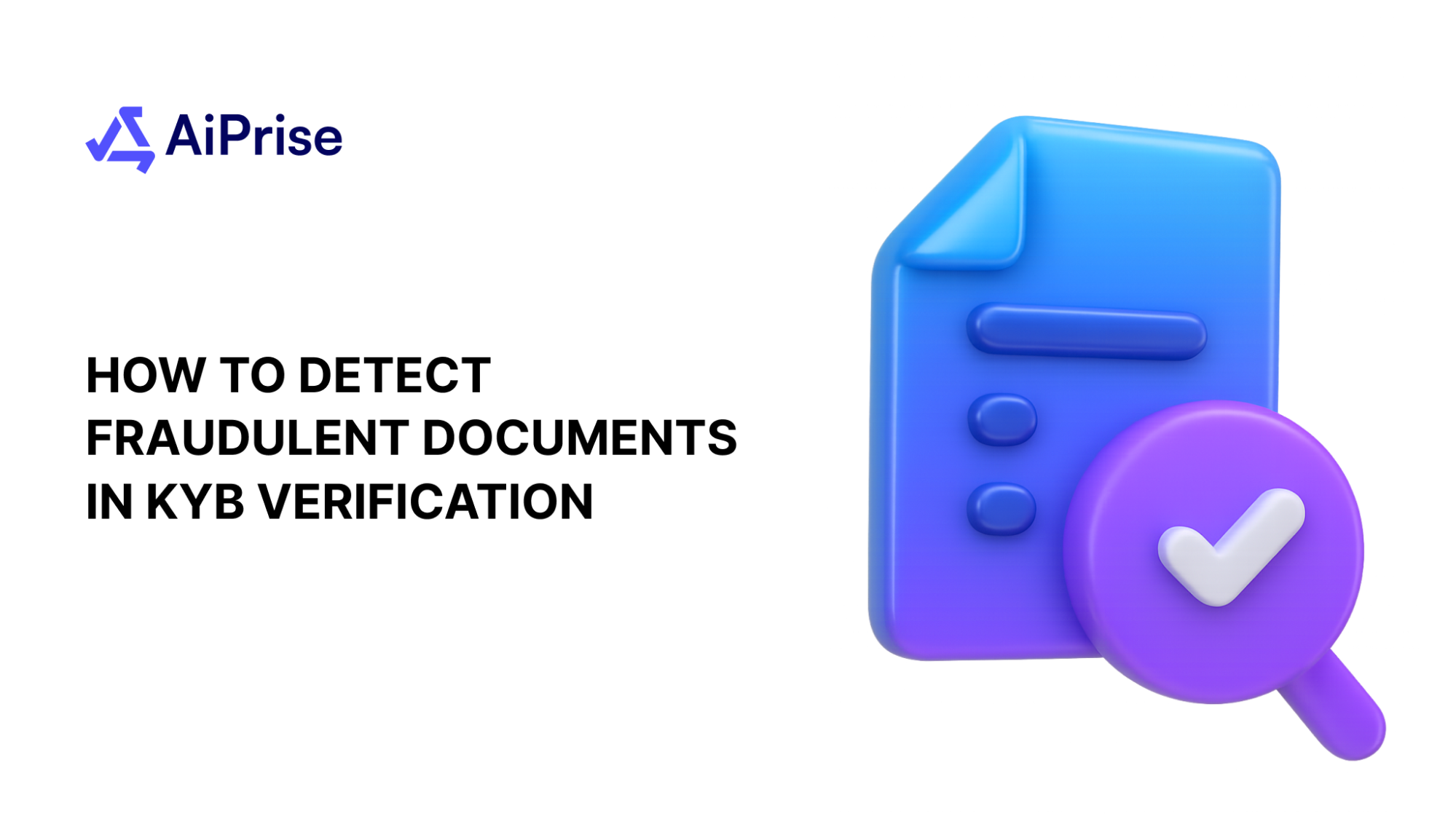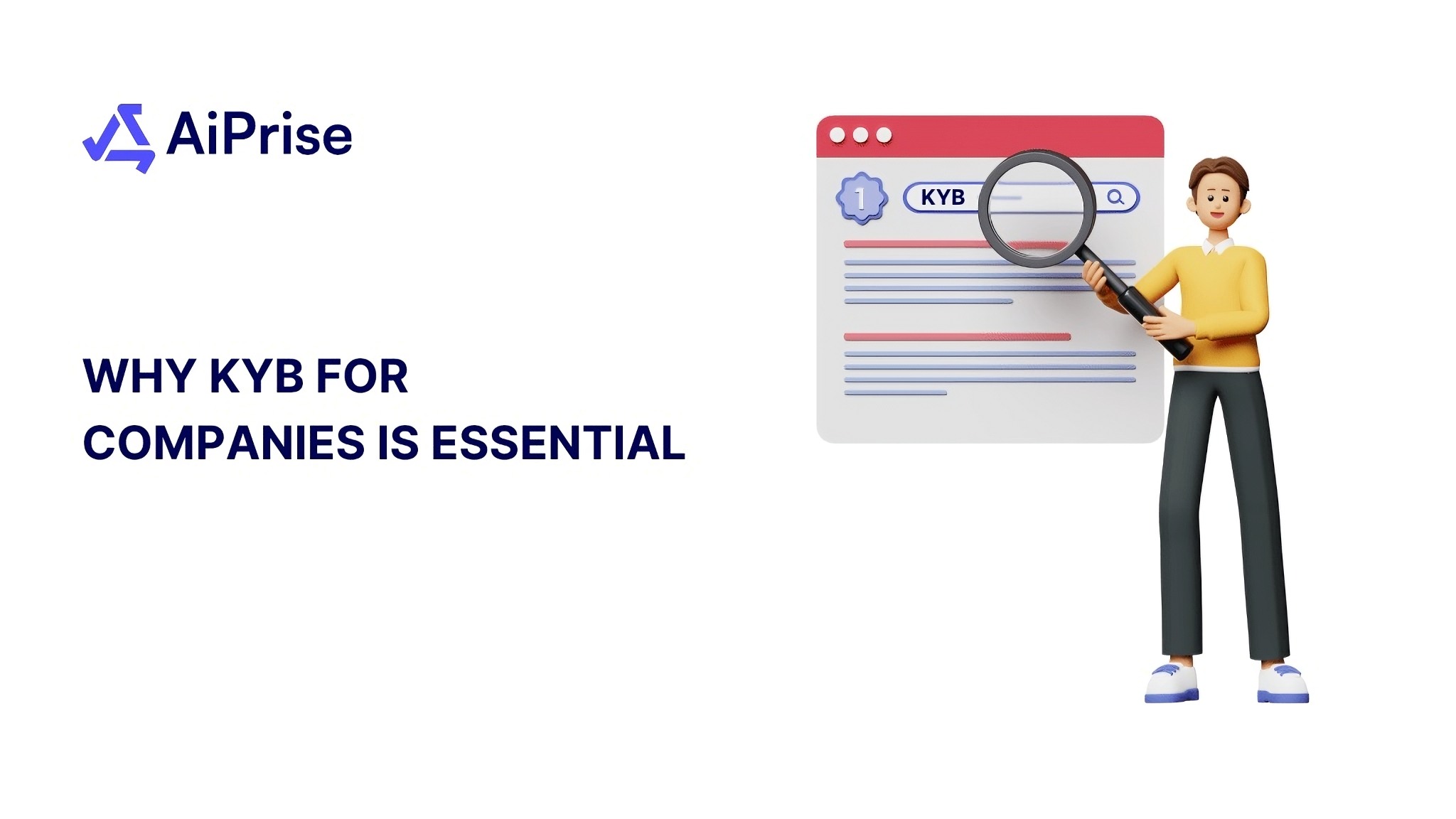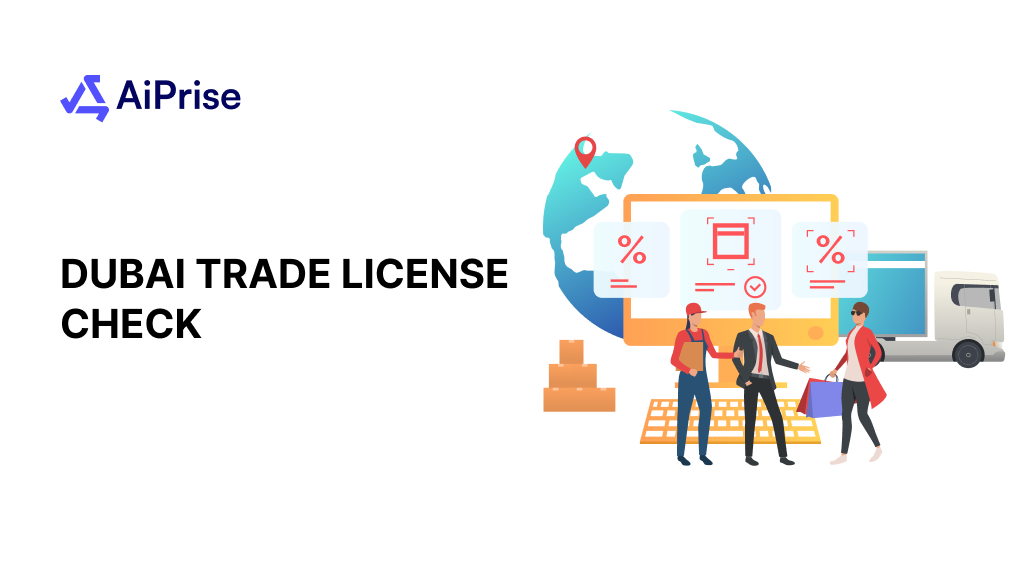AiPrise
8 mins
May 31, 2025
Why KYB is Broken: Global Challenges, Costs, and the Path Forward

Key Takeaways

Ut sodales, ex sit amet consectetur accumsan, nibh ex sollicitudin metus, volutpat lacinia arcu nibh vel ante. Proin dapibus dui eget justo tincidunt eleifend.

Ut sodales, ex sit amet consectetur accumsan, nibh ex sollicitudin metus, volutpat lacinia arcu nibh vel ante. Proin dapibus dui eget justo tincidunt eleifend.

Ut sodales, ex sit amet consectetur accumsan, nibh ex sollicitudin metus, volutpat lacinia arcu nibh vel ante. Proin dapibus dui eget justo tincidunt eleifend.

Ut sodales, ex sit amet consectetur accumsan, nibh ex sollicitudin metus, volutpat lacinia arcu nibh vel ante. Proin dapibus dui eget justo tincidunt eleifend.

Ut sodales, ex sit amet consectetur accumsan, nibh ex sollicitudin metus, volutpat lacinia arcu nibh vel ante. Proin dapibus dui eget justo tincidunt eleifend.

Ut sodales, ex sit amet consectetur accumsan, nibh ex sollicitudin metus, volutpat lacinia arcu nibh vel ante. Proin dapibus dui eget justo tincidunt eleifend.

Ut sodales, ex sit amet consectetur accumsan, nibh ex sollicitudin metus, volutpat lacinia arcu nibh vel ante. Proin dapibus dui eget justo tincidunt eleifend.

Ut sodales, ex sit amet consectetur accumsan, nibh ex sollicitudin metus, volutpat lacinia arcu nibh vel ante. Proin dapibus dui eget justo tincidunt eleifend.

Ut sodales, ex sit amet consectetur accumsan, nibh ex sollicitudin metus, volutpat lacinia arcu nibh vel ante. Proin dapibus dui eget justo tincidunt eleifend.

Ut sodales, ex sit amet consectetur accumsan, nibh ex sollicitudin metus, volutpat lacinia arcu nibh vel ante. Proin dapibus dui eget justo tincidunt eleifend.
In today’s digital-first world, where businesses scale across borders faster than ever, verifying the legitimacy of other businesses shouldn't be a bottleneck. But it is. Know Your Business (KYB), a core requirement for onboarding and compliance, is outdated, fragmented, and painfully manual. Whether you’re a fast-moving fintech or a legacy financial institution, the same problems persist, inconsistent data, high compliance costs, long verification times, and broken user experiences. It’s time to ask the hard question: Why is KYB still broken in 2025?
Fragmented Global Systems and Poor Data Access
One of the biggest reasons KYB is broken is the lack of access to reliable, standardized business data worldwide.There is no global database of companies. The closest anyone has come is Dun & Bradstreet, a 150-year-old company. Even within a single country, data lives in silos. For eg: In India, for instance, GST data is in the GST database, business incorporation data is with the Ministry of Corporate Affairs (MCA), and tax information is tied to PAN records. Public registries across countries vary widely in format, availability, and accuracy and none of these offer a reliable picture of UBOs. In many regions, business records are incomplete or inaccessible altogether. This makes verifying ownership, legal structure, and legitimacy of a business slow and error-prone.
Businesses trying to expand globally must deal with a patchwork of systems, no APIs, no real-time updates, no consistent identifiers. This lack of uniformity slows everything down and exposes companies to fraud, regulatory risk, and lost revenue.
KYB Is Manual and Time-Consuming; Delayed Onboarding
95% of KYB is still done manually. Whether it's banks verifying documents or fintechs chasing registration numbers, most organizations still rely on humans to collect, review, and validate business information. “A single KYB can take anywhere from one day to three weeks. And that’s just the beginning, if you’re expanding across borders, the duration is even larger. Without scalable automation, the only way to meet growing demand is by hiring more people.
Manual KYB leads to longer onboarding cycles, bloated compliance teams, and costly errors. It also has a direct impact on revenue. Cutting onboarding time from 80 days to just 5 doesn’t just improve customer experience, it gives you 75 extra days to build a relationship, drive transactions, and grow.
And when onboarding takes too long or feels too complex, businesses leave. Studies show that 68% of potential customers drop off during onboarding, a stat that translates to millions in lost revenue. Companies that prioritize seamless KYB, like Mercury, become the default for SMBs and startups, while legacy institutions struggle to keep up.
The Real Cost of KYB ; High Operational Costs
KYB doesn’t just slow things down, it gets expensive. Companies are forced to juggle multiple third-party tools: one for identity verification, another for business registry checks, and another for sanctions screening. Teams spend time not just verifying customers, but also managing these tools.This fragmented setup leads to overlapping costs and internal inefficiencies.
Worse, you’re often spending hundreds of dollars to verify a business before they even become a paying customer. “KYB comes before everything”. “You’re spending heavily upfront, and if the process is broken or slow, you lose that customer to someone else.”
Most compliance teams are overwhelmed, managing spreadsheets, chasing documents, and firefighting false positives. Banks reportedly spend millions annually just to stay compliant, without gaining any speed, intelligence, or strategic advantage.
Instead of a centralized, all-in-one solution, companies end up juggling systems, leading to more manual work and poor scalability.
Compliance Complexity and Regulatory Fragmentation
KYB is inherently complex, especially when operating in multiple jurisdictions. Regulations vary not just by country, but also by industry. There’s no global rulebook. That means a fintech company in Nigeria, a bank in France, and a payments company in Singapore all interpret and implement KYB differently.
Companies must keep up with evolving AML directives, FATF guidelines, and local laws.This inconsistency leads to over-collection of data, redundant checks, and higher regulatory risk. Companies that can’t keep up risk reputational damage, penalties, or being shut out of new markets. “KYC has evolved with the times, biometric ID, OCR, video KYC - but KYB? It hasn’t changed in 50 years.
Internal Silos & Resistance to change
Many institutions still operate in silos, where data isn’t shared between teams. Compliance and risk teams might not have full access to the same customer information.This slows down decision-making and opens up blind spots in monitoring and fraud detection.
This lack of alignment prevents real-time monitoring and risk assessment. It also slows down the KYB process and increases the likelihood of regulatory gaps.
Now is the right time to invest in technology and make KYB your strategic advantage. Companies that do this will move faster, onboard smarter, and win trust, not just with regulators, but with customers
Despite the rise of Regulatory Technology, KYB processes haven’t evolved fast enough. Many organizations hesitate to adopt new technology due to fear of disruption, especially in high-touch segments. There’s also a trust gap, companies worry if automation can be as reliable as human verification.
As a result, businesses stick to outdated workflows, even though they know it slows them down. This fear of change keeps KYB stuck in the past.
The Path Forward: Real-Time, Reusable, AI-Powered KYB
KYB needs a reset and it starts with rethinking its very foundations. Business verification must become real-time, happening in minutes instead of days or weeks. It should also be reusable, enabling businesses to complete KYB once and use it across multiple platforms through a secure, digital KYB wallet. Most importantly, KYB needs to be intelligent. AI has the power to uncover insights that human review often misses, identifying hidden UBO relationships, flagging risky behaviors early, and continuously monitoring for emerging threats. Already, conversational intelligence is helping compliance teams work smarter by reducing manual call reviews by 60%, boosting efficiency by 90%, and lowering compliance risk by 50%. This is the future of KYB: automation with oversight, not automation without control. Companies that solve this will onboard faster, reduce fraud, cut costs, and ultimately, win in a digital-first world.
You might want to read these...

AiPrise’s data coverage and AI agents were the deciding factors for us. They’ve made our onboarding 80% faster. It is also a very intuitive platform.





Speed Up Your Compliance by 10x
Automate your compliance processes with AiPrise and focus on growing your business.


.jpg)








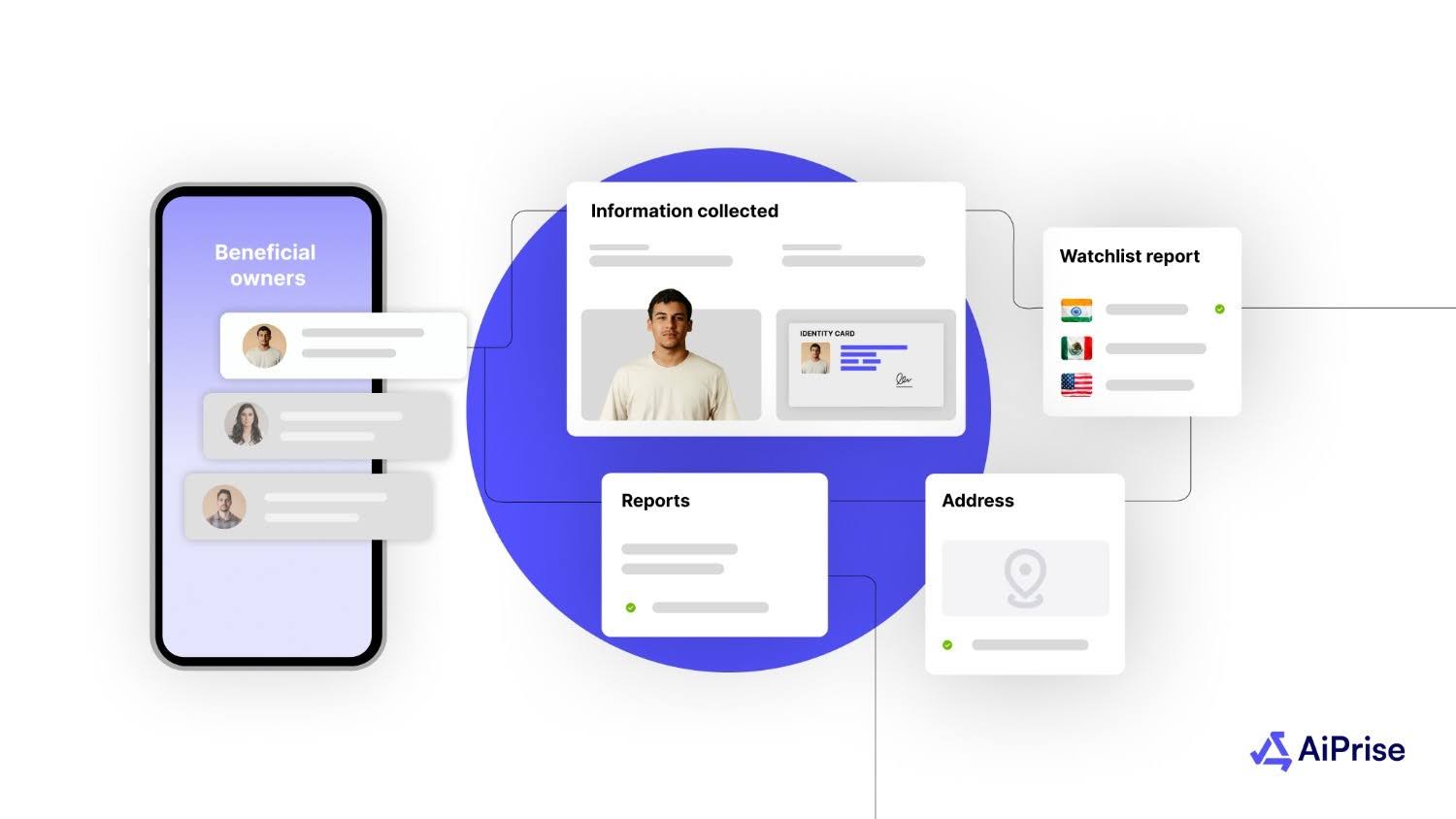
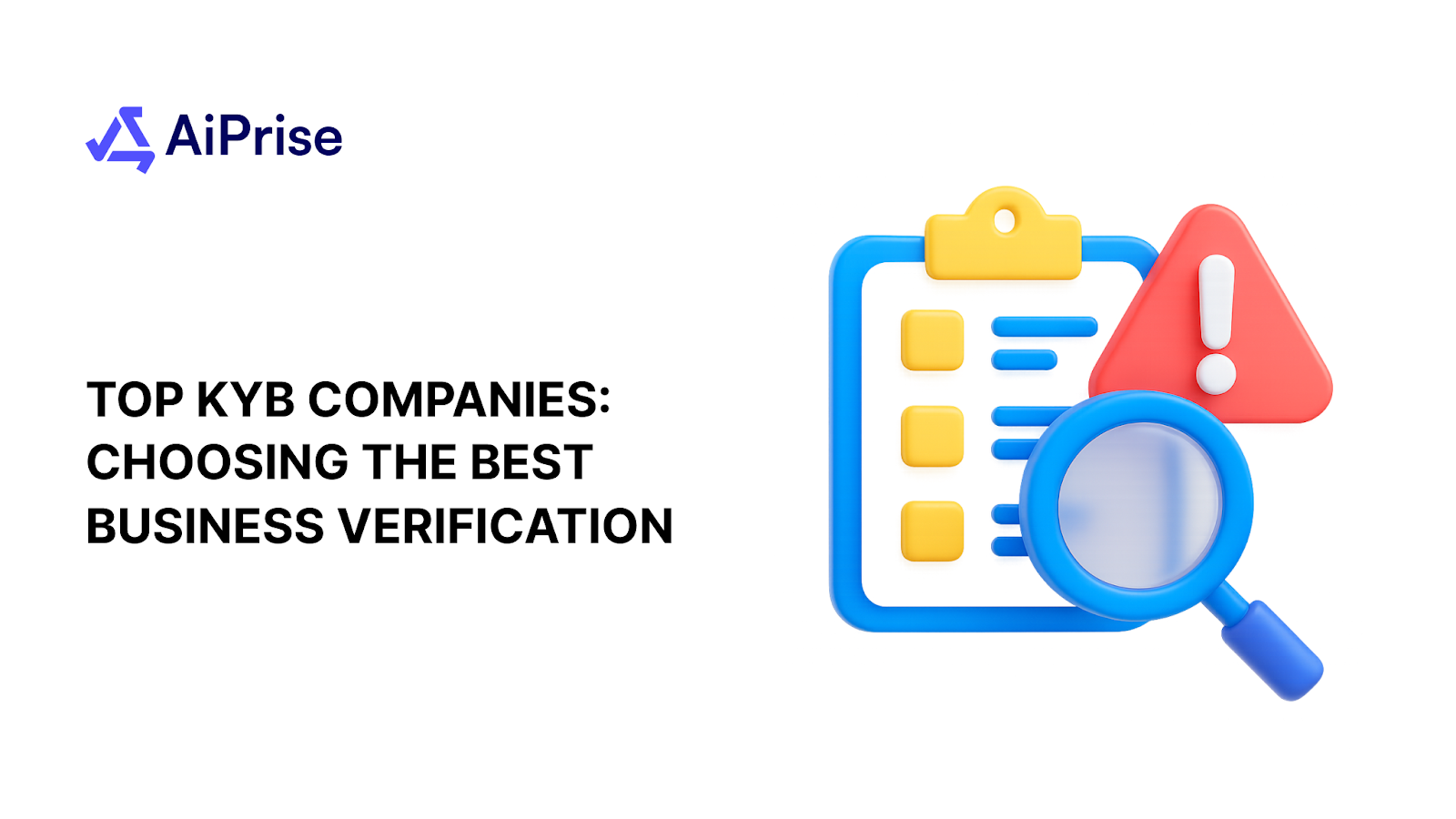
%20Can%20Improve%20Your%20Compliance%20Strategy.png)
